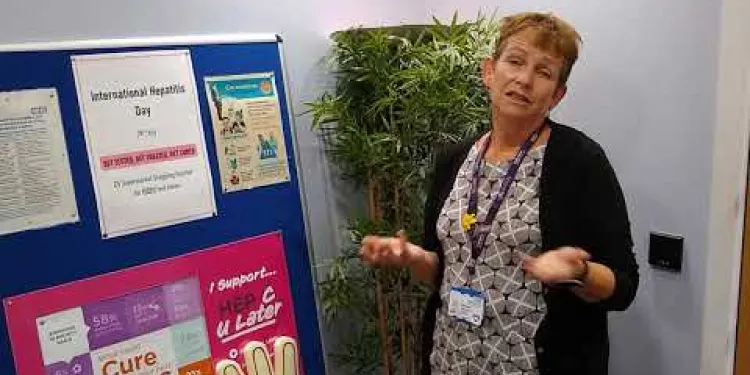
Find Help
More Items From Ergsy search
-

Why is it important to increase awareness about CFS?
Relevance: 100%
-

Can CFS be prevented?
Relevance: 58%
-

What is the prognosis for someone with CFS?
Relevance: 54%
-

Does physical exercise help people with CFS?
Relevance: 50%
-

How does CFS differ from regular fatigue?
Relevance: 50%
-

Can CFS symptoms fluctuate over time?
Relevance: 49%
-

How does post-exertional malaise relate to CFS?
Relevance: 48%
-

Myalgic encephalomyelitis or chronic fatigue syndrome (ME/CFS) | NHS
Relevance: 48%
-

Alcohol Awarerness Week
Relevance: 35%
-

What is chronic fatigue syndrome?
Relevance: 34%
-

Who is at risk of developing chronic fatigue syndrome?
Relevance: 33%
-

Are there psychological aspects to chronic fatigue syndrome?
Relevance: 30%
-

Raising awareness of ovarian cancer
Relevance: 29%
-

Can children develop chronic fatigue syndrome?
Relevance: 29%
-

Mouth Cancer Awareness
Relevance: 29%
-

What role do infections play in chronic fatigue syndrome?
Relevance: 28%
-

How is chronic fatigue syndrome treated?
Relevance: 28%
-

Swallowing awareness - dysphagia
Relevance: 27%
-

Scams of 2024/2025 ? (Be Aware)
Relevance: 27%
-

Sue Doherty on hepatitis C awareness
Relevance: 27%
-

Joan's story - Aphasia Awareness
Relevance: 26%
-

Is chronic fatigue syndrome contagious?
Relevance: 26%
-

How does increased screening impact bowel cancer statistics?
Relevance: 25%
-

Do insurance rates increase for drivers over 70?
Relevance: 25%
-

What factors are contributing to the increase in bowel cancer cases?
Relevance: 25%
-

What healthcare policies should support workers be aware of?
Relevance: 24%
-

Is chronic fatigue syndrome a mental illness?
Relevance: 24%
-

What factors increase my risk of colorectal cancer?
Relevance: 24%
-

Are there any hidden fees I should be aware of?
Relevance: 24%
-

Oral Health Awareness - Tooth Decay
Relevance: 24%
-

Why is the National Living Wage being increased?
Relevance: 24%
-

Can playing sports increase the risk of a concussion?
Relevance: 23%
-

UK national living wage increase 2026
Relevance: 23%
-

Greenwashing Lawsuits Increase as Environmental Claims Face Legal Checks
Relevance: 23%
-

Local Councils Struggle with Increasing Demand for Welfare Support
Relevance: 23%
-

Will the increase in the National Living Wage affect inflation?
Relevance: 22%
-

When will the state pension age increase to 67?
Relevance: 22%
-

What can increase the risk of jaundice in a baby?
Relevance: 22%
-

Will the state pension amount change with the age increase?
Relevance: 22%
-

Can a sudden decrease or increase in followers indicate a hack?
Relevance: 22%
Understanding Chronic Fatigue Syndrome (CFS)
Chronic Fatigue Syndrome (CFS), also known as Myalgic Encephalomyelitis (ME), is a debilitating condition marked by extreme fatigue that does not improve with rest. This condition significantly impairs daily functioning and affects a person's quality of life. Despite its severe impact, CFS remains poorly understood and frequently misdiagnosed. In the UK, increasing awareness about CFS is crucial to improving diagnosis, treatment, and support for those affected.
Challenges in Diagnosis
One of the main challenges with CFS is the difficulty in diagnosis. There is no definitive test for CFS, and its symptoms often mimic those of other conditions such as fibromyalgia and hypothyroidism. Consequently, many individuals endure prolonged periods of uncertainty before receiving a diagnosis. By raising awareness, healthcare professionals can be better equipped to recognise and understand the condition, leading to more timely and accurate diagnoses. This can alleviate the burden of uncertainty and enable patients to access appropriate care sooner.
Improving Treatment Options
Increased awareness of CFS can enhance research efforts aimed at understanding the underlying causes of the condition and discovering effective treatments. Currently, treatments focus primarily on symptom management rather than curing the illness. With more awareness and subsequent funding, research initiatives can push forward, potentially leading to breakthroughs that provide real relief for sufferers. In the UK, supporting studies and promoting an understanding of CFS can drive innovation in treatment protocols and improve patient outcomes.
Supporting Patients and Reducing Stigma
CFS often puts individuals in the challenging position of justifying their illness to others due to its invisibility and misunderstanding. Many patients face stigma and disbelief from friends, family, employers, and even healthcare providers, which can exacerbate the condition. Heightened awareness helps change public perception, fostering an environment of support and empathy. By understanding that CFS is a genuine and serious illness, communities can offer better support to those affected, reducing feelings of isolation.
Influencing Policy and Social Services
Greater awareness of CFS can influence policymakers and ensure that adequate resources are allocated to this condition. By highlighting the needs of those with CFS, advocacy efforts can lead to improved healthcare policies, increased funding for research, and better social services for patients in the UK. Recognising CFS as a critical public health issue can drive systemic changes necessary to support the well-being of those affected by this challenging condition.
Conclusion
Raising awareness about CFS is vital in transforming the lives of those who endure its daily challenges. Through improved understanding, enhanced research, supportive communities, and informed policies, we can foster an environment where individuals with CFS receive the respect, empathy, and care they need. In the UK, prioritising awareness efforts is a crucial step towards making meaningful progress in the battle against this condition.
What is Chronic Fatigue Syndrome (CFS)?
Chronic Fatigue Syndrome (CFS) is also called Myalgic Encephalomyelitis (ME). People with CFS feel very tired all the time. Resting does not help them feel better. CFS makes it hard to do daily activities. It affects how people live and feel happy. Many people do not understand CFS, and doctors sometimes do not know when someone has it. In the UK, it is important for more people to learn about CFS so people can get the right help.
Problems Finding Out If You Have CFS
It is hard for doctors to tell if someone has CFS. There is no test to show if you have it. The signs of CFS are a lot like signs of other sicknesses like fibromyalgia. Because of this, people often wait a long time to find out if they have CFS. If more people know about CFS, doctors can learn to spot it better. This can help people get the right care faster and feel less worried.
Better Ways to Help People with CFS
If more people know about CFS, scientists can study it more. This can help them find out why people get CFS and how to make them feel better. Right now, treatments only help with the symptoms, not the cause. If more people know about CFS, more money can be used for research. This can help find better ways to treat CFS and make people feel better in the UK.
Helping People with CFS and Stopping Unkindness
People with CFS look healthy, so others might not believe they are sick. Because of this, people with CFS sometimes feel alone or not understood. They can feel hurt when friends, family, or doctors do not understand their sickness. If more people know about CFS, they can be kinder and more helpful. This can help people with CFS feel better supported and less lonely.
Changing Rules and Helping With Services
If more people and leaders know about CFS, they can make better rules to help people who have it. Talking about what people with CFS need can help get more money for research and better services for them in the UK. Seeing CFS as an important health issue can help make big changes to help people with CFS live better lives.
Conclusion
Talking more about CFS is important for helping people who have it. By learning more and being kinder, we can support people with CFS better in the UK. Better knowledge, research, and rules can help people with CFS get the respect and care they need.
Frequently Asked Questions
What is CFS?
Chronic Fatigue Syndrome (CFS) is a complex disorder characterized by extreme fatigue that cannot be explained by any underlying medical condition. The fatigue worsens with physical or mental activity but does not improve with rest.
Why is increasing awareness about CFS important?
Increasing awareness about CFS is important to improve diagnosis rates, support research for treatment, reduce stigma, and provide understanding and support to those living with the condition.
How does awareness contribute to earlier diagnosis?
Awareness helps healthcare professionals and the public recognize the symptoms of CFS sooner, leading to earlier diagnosis and management of the condition.
What role does awareness play in reducing stigma?
Increasing awareness about CFS can reduce stigma by educating the public that it is a legitimate medical condition, not merely psychological or a result of laziness.
How can awareness lead to better treatment options?
With more awareness, there's greater demand and support for research, potentially leading to the development of more effective treatments and management strategies for CFS.
How does awareness improve support for patients with CFS?
Awareness can lead to a more supportive environment for CFS patients, including better workplace accommodations, improved social support, and understanding from family and friends.
Why is public education on CFS symptoms necessary?
Public education on CFS symptoms is necessary to facilitate early recognition and reduce the burden on patients who often navigate skepticism and misunderstanding from others.
Can awareness impact funding for CFS research?
Yes, increased awareness can lead to more advocacy efforts, which often result in increased funding from both government and private sectors for CFS research.
What are common misconceptions about CFS?
Common misconceptions include the belief that CFS is just being tired, it's a psychological issue, or that it can be fully overcome with just lifestyle changes.
How does raising CFS awareness benefit healthcare providers?
It equips healthcare providers with better knowledge and understanding to diagnose and manage CFS, leading to improved patient outcomes.
How can increasing awareness about CFS help caregivers?
Awareness can provide caregivers with the tools and knowledge to better support and assist individuals with CFS, and validate their challenges.
What is the impact of awareness on CFS patient advocacy?
Increased awareness strengthens advocacy efforts by uniting patients, organizations, and stakeholders to push for policy changes and improved care standards.
Why is CFS underdiagnosed?
CFS is underdiagnosed due to a lack of specific diagnostic tests, varying symptom presentation, and sometimes limited awareness among healthcare professionals.
How can schools support students with CFS through awareness?
Schools can implement flexible academic plans, provide rest opportunities, and promote a supportive environment for students with CFS by understanding the impact of their condition.
What are effective ways to increase public awareness about CFS?
Effective ways include using social media campaigns, community events, advocacy group initiatives, and educational programs targeting both the public and healthcare sectors.
How does awareness affect mental health in CFS patients?
Awareness can positively impact mental health by reducing feelings of isolation, increasing understanding from others, and improving access to appropriate mental health resources.
In what ways can global awareness about CFS create change?
Global awareness can lead to international collaboration in research, standardized diagnostic criteria, and the sharing of effective treatment and management strategies.
What barriers exist to increasing CFS awareness?
Barriers include misconceptions, limited visibility of the condition, inadequate funding, and sometimes lack of interest from media and public health institutions.
How do personal stories and experiences help raise CFS awareness?
Personal stories provide a human face to the condition, fostering empathy, educating the public, and empowering those affected to share their realities.
What can individuals do to help spread awareness about CFS?
Individuals can share educational materials, participate in awareness events, support research and advocacy groups, and engage in conversations to educate others about CFS.
What is CFS?
CFS stands for Chronic Fatigue Syndrome. It makes people feel very tired all the time. Even if they rest, they still feel tired.
It's hard for doctors to find out why it happens. It can make doing everyday things difficult.
If you have CFS, here are some things that might help:
- Rest when you need to.
- Try to do a little bit each day.
- Talk to a doctor for advice.
Some tools that can help:
- Use a diary to track how you feel.
- Apps that remind you to rest.
- Quiet places to help you feel calm.
Chronic Fatigue Syndrome (we can call it CFS) makes people feel very tired. This tiredness does not go away. Doctors do not know why this happens.
If someone with CFS does things like running or thinking hard, they feel even more tired. Resting does not help them feel better.
Why is it important to talk about CFS?
CFS stands for Chronic Fatigue Syndrome. It makes people feel very tired all the time.
Here is why talking about CFS is important:
- Helps people understand what CFS is.
- Makes it easier for people to get support.
- Encourages more research to find treatments.
Tools and tips that can help:
- Use pictures or videos to learn more about CFS.
- Write down questions to ask a doctor.
- Join a support group to talk with others.
It is good to know more about CFS. This helps doctors find it quicker, helps scientists find ways to help, makes people kinder to those who have it, and helps everyone understand CFS better.
How can knowing about a disease help doctors find it sooner?
Awareness helps doctors and people notice the signs of CFS (Chronic Fatigue Syndrome) sooner. This means it can be diagnosed and treated earlier.
How does knowing more help to stop stigma?
Teaching people about CFS can help them understand that it is a real illness. It is not just in someone's head, and it is not because they are lazy.
How can knowing more help doctors give better treatments?
When people know more about an illness, doctors can find better ways to help them feel better.
It's good to talk about diseases and learn about them. This way, more people know what to do. You can:
- Ask questions when you visit the doctor.
- Read simple books about health.
- Watch videos made for kids to understand health.
- Use apps that help you learn about your body.
Remember, learning about health helps you make smart choices.
When more people know about CFS, it means more people want to help. This can lead to finding better ways to treat and manage CFS.
How does knowing about CFS help people who have it?
When we learn more about CFS, we can help people who have it feel better. CFS stands for Chronic Fatigue Syndrome.
If more people understand CFS:
- Doctors can give better care.
- Friends and family can be more helpful.
- People with CFS do not feel alone.
Tools that can help:
- Use pictures to explain things.
- Make sure to speak slowly and clearly.
- Ask questions to check if the person understands.
Knowing about CFS can help people with CFS feel more supported. It can make work and life easier, with help from friends, family, and people at work.
Why do we need to teach people about CFS symptoms?
CFS stands for Chronic Fatigue Syndrome. It makes people very, very tired. Here is why teaching about CFS is important: 1. **Know the Symptoms**: When people learn about CFS, they can understand the signs. This helps them know if someone might have it. 2. **Help and Support**: If more people know about CFS, they can help and support those who have it. 3. **Reduce Confusion**: Teaching about CFS makes things less confusing. People can understand what it is and that it is real. Here are some ways to learn and remember: - Use short and clear sentences. - Look at pictures that explain CFS. - Listen to videos or talks about CFS. These tools can help make learning about CFS easier.It is important to teach people about CFS symptoms. This helps recognize it early and makes it easier for people who have CFS. It also helps people understand, so there is less doubt and confusion.
Can knowing about CFS help get more money for research?
Yes, when more people know about something, it can lead to more people speaking up and helping. This can mean that the government and businesses give more money to study CFS and find answers.
What do people often get wrong about CFS?
Some people think wrong things about CFS. They think CFS is only feeling tired. They also think it's all in your head. Some believe you can make it go away by changing how you live.
How does teaching people about CFS help doctors and nurses?
It helps doctors and nurses learn more about CFS. This makes it easier for them to find out if someone has CFS and take care of them. This helps people with CFS feel better.
How can knowing more about CFS help caregivers?
Knowing more about CFS can help caregivers do their jobs better.
Here are some ways it helps:
1. Understanding: Caregivers understand what CFS is and how it makes people feel.
2. Support: They can give better support to those who have CFS.
3. Care Tips: Caregivers can learn tips to help people with CFS feel better.
Tools and Help: There are tools and ways to learn more. Books, websites and videos can help. Talking to others who help people with CFS can be useful too.
When people know more about CFS, they can help those who have it. They can learn ways to support people with CFS and understand their struggles.
How does knowing about CFS help people speak up?
More people knowing about something helps make a strong team. This team has patients, groups, and people who make rules. They all work together to make things better and help people get good care.
Why do doctors not find CFS in everyone who has it?
Doctors don't always figure out if someone has CFS because:
- There aren't special tests to find CFS.
- People can have different symptoms.
- Some doctors might not know much about CFS.
How can schools help students with CFS by understanding it better?
CFS means Chronic Fatigue Syndrome. It's when someone feels very tired all the time. It's not their fault, and rest doesn't always help. Schools can learn about CFS so they can help students who have it.
Here are some ways schools can help:
- Learn about CFS. Teachers and students can read or watch videos to understand it better.
- Listen to students with CFS. Ask them how they are feeling and what they need.
- Give breaks. Let students with CFS take rests when they need to.
- Help with schoolwork. Give extra time for homework or let them take tests in a quiet place.
- Be kind. Be patient and nice to students with CFS.
Supporting students with CFS helps them do better in school and feel happier.
Schools can make special plans for students who have CFS. They can give students time to rest and create a kind and helpful place. This helps students feel better and learn more.
How can we help more people learn about CFS?
CFS stands for Chronic Fatigue Syndrome. It makes people feel very tired all the time.
Here are some easy ways to help people know more about CFS:
- Make simple posters and put them in places where lots of people go, like schools or libraries.
- Tell stories about people who have CFS to help others understand.
- Use social media to share pictures and videos about CFS.
- Ask local newspapers or radio to talk about CFS.
- Organize fun events or walks to raise money and teach people about CFS.
To make it even easier, you can:
- Use simple words and short sentences.
- Use pictures and big letters to help people understand.
- Explain things slowly and repeat key points.
There are good ways to spread a message. You can use social media to share it. You can have community events to talk about it. Advocacy groups can help too. Also, teaching programs can help both people and healthcare workers learn more.
How does knowing about CFS affect how people feel?
When people learn more about CFS (Chronic Fatigue Syndrome), it can help them feel better. Knowing about CFS can help them understand why they feel tired and what they can do to feel better.
Talking to doctors, using simple breathing exercises, or joining a support group can be helpful too.
Knowing more about mental health can help us feel better. It can make us feel less alone, help other people understand us, and help us find the right kind of help.
How can knowing more about CFS help make things better?
Knowing about the whole world can help people work together on big projects, like finding out how things make us sick and how to help people feel better. They can share the best ways to do things and learn from each other.
What makes it hard for people to learn about CFS?
There are some things that make it hard for people to understand this condition:
- People might have wrong ideas about it.
- People might not see or hear much about it.
- There might not be enough money to help with it.
- Sometimes, news and health groups do not talk about it enough.
To help understand better, you can use tools like pictures, videos, or simple language books. Talking with friends or joining a group can also help a lot.
How do stories help people learn about CFS?
Sharing personal stories helps people understand what CFS is. CFS means Chronic Fatigue Syndrome. It's when someone feels tired all the time. Listening to or reading stories can help others see what it's like to have CFS.
Here are some ways stories can help:
- Understanding: Stories show how people with CFS feel each day. This helps everyone understand them better.
- Support: When people know more about CFS, they can help and support those who have it.
- Awareness: Stories spread information about CFS. This makes more people know about it.
Here are some tools and techniques that can help:
- Videos: Watching videos about CFS can make learning easier.
- Pictures: Pictures and drawings can help explain CFS.
- Simple Books: Reading simple books about CFS is helpful.
Personal stories help people understand what it is like to have a condition. These stories make others care, teach everyone more, and help people with the condition feel strong enough to share their own stories.
How can you help people learn about CFS?
You can tell others what CFS is in simple words.
You can share stories about people with CFS.
You can use pictures or videos to show what CFS is like.
You can talk about CFS at school or in your community.
Tools like speech-to-text can help you write about CFS.
People can help by sharing learning materials, joining events, supporting research and helping groups, and talking to others to teach them about CFS.
Useful Links
Have you found an error, or do you have a link or some information you would like to share? Please let us know using the form below.
-->
This website offers general information and is not a substitute for professional advice.
Always seek guidance from qualified professionals.
If you have any medical concerns or need urgent help, contact a healthcare professional or emergency services immediately.
Some of this content was generated with AI assistance. We’ve done our best to keep it accurate, helpful, and human-friendly.
- Ergsy carfully checks the information in the videos we provide here.
- Videos shown by Youtube after a video has completed, have NOT been reviewed by ERGSY.
- To view, click the arrow in centre of video.
- Most of the videos you find here will have subtitles and/or closed captions available.
- You may need to turn these on, and choose your preferred language.
- Go to the video you'd like to watch.
- If closed captions (CC) are available, settings will be visible on the bottom right of the video player.
- To turn on Captions, click settings .
- To turn off Captions, click settings again.
More Items From Ergsy search
-

Why is it important to increase awareness about CFS?
Relevance: 100%
-

Can CFS be prevented?
Relevance: 58%
-

What is the prognosis for someone with CFS?
Relevance: 54%
-

Does physical exercise help people with CFS?
Relevance: 50%
-

How does CFS differ from regular fatigue?
Relevance: 50%
-

Can CFS symptoms fluctuate over time?
Relevance: 49%
-

How does post-exertional malaise relate to CFS?
Relevance: 48%
-

Myalgic encephalomyelitis or chronic fatigue syndrome (ME/CFS) | NHS
Relevance: 48%
-

Alcohol Awarerness Week
Relevance: 35%
-

What is chronic fatigue syndrome?
Relevance: 34%
-

Who is at risk of developing chronic fatigue syndrome?
Relevance: 33%
-

Are there psychological aspects to chronic fatigue syndrome?
Relevance: 30%
-

Raising awareness of ovarian cancer
Relevance: 29%
-

Can children develop chronic fatigue syndrome?
Relevance: 29%
-

Mouth Cancer Awareness
Relevance: 29%
-

What role do infections play in chronic fatigue syndrome?
Relevance: 28%
-

How is chronic fatigue syndrome treated?
Relevance: 28%
-

Swallowing awareness - dysphagia
Relevance: 27%
-

Scams of 2024/2025 ? (Be Aware)
Relevance: 27%
-

Sue Doherty on hepatitis C awareness
Relevance: 27%
-

Joan's story - Aphasia Awareness
Relevance: 26%
-

Is chronic fatigue syndrome contagious?
Relevance: 26%
-

How does increased screening impact bowel cancer statistics?
Relevance: 25%
-

Do insurance rates increase for drivers over 70?
Relevance: 25%
-

What factors are contributing to the increase in bowel cancer cases?
Relevance: 25%
-

What healthcare policies should support workers be aware of?
Relevance: 24%
-

Is chronic fatigue syndrome a mental illness?
Relevance: 24%
-

What factors increase my risk of colorectal cancer?
Relevance: 24%
-

Are there any hidden fees I should be aware of?
Relevance: 24%
-

Oral Health Awareness - Tooth Decay
Relevance: 24%
-

Why is the National Living Wage being increased?
Relevance: 24%
-

Can playing sports increase the risk of a concussion?
Relevance: 23%
-

UK national living wage increase 2026
Relevance: 23%
-

Greenwashing Lawsuits Increase as Environmental Claims Face Legal Checks
Relevance: 23%
-

Local Councils Struggle with Increasing Demand for Welfare Support
Relevance: 23%
-

Will the increase in the National Living Wage affect inflation?
Relevance: 22%
-

When will the state pension age increase to 67?
Relevance: 22%
-

What can increase the risk of jaundice in a baby?
Relevance: 22%
-

Will the state pension amount change with the age increase?
Relevance: 22%
-

Can a sudden decrease or increase in followers indicate a hack?
Relevance: 22%


